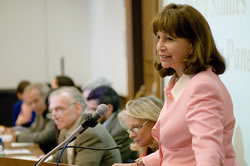TC: America's Policy Mecca
"The more the merrier," said President Susan Fuhrman welcoming TC's students to the College's 5th Annual Policy Studies Orientation Panel on September 12th. Fuhrman's reference was to TC's unrivaled breadth of policy-related courses and programs. However she was also keynoting an event specifically designed to help students navigate this rich assortment which in the past has sometimes puzzled newcomers.
In a broad overview, Sharon Lynn Kagan, the Virginia and Leonard Marx Professor of Early Childhood and Family Policy and Associate Dean for Policy and Director of the Office of Policy and Research told the audience that "Teachers College is truly America's policy mecca" with "not only an intellectual history, but also a policy capacity across an array of domains that are critically important to the full development of children, students and a healthy society."
Kagan explained that at TC, policy work can be achieved in a number of ways: through individual courses, the College-wide concentration, one of six policy programs, and/or by participating in the Student Policy Network. Kagan, TC's first Associate Dean for Policy, has dedicated herself to nurturing and expanding TC's policy mecca. Among her accomplishments since assuming that post in 2004 are: establishing a 10-member Policy Advisory Committee, representing five academic departments, that is actively involved in decisions that bring policy to the fore; surveying faculty and students on their needs; building stronger linkages between various departments; creating a Web site that brings together all policy work being done at TC; and establishing a policy fellowship.
Amy Stuart Wells, Professor of Sociology and Education and the Policy Studies Coordinator, walked students through the various policy study options. Wells explained that the most basic level of policy studies at TC is the college-wide policy concentration. Students from any program can opt for the college-wide policy concentration. A student interested in this enrolls in a specified sequence of policy courses within the Sociology and Education Program and earns a "Policy Concentration" certificate of completion. Students who want education policy to be more central to their graduate studies can apply to one of six degree programs that weave many policy classes into their required curriculum. These six programs are: Early Childhood Education, Economics and Education, Educational Leadership Program, International Educational Development, Politics and Education and Sociology and Education. Each of these six degree programs offers a unique lens through which students examine education policy. Finally, at the other end of the spectrum, students are free to enroll in individual policy courses that are open to everyone at TC.
Several faculty members were on hand to speak about the degree programs as well as the policy courses that they offer: Thomas Bailey on the Economics and Education program; Jeffrey Henig on the Politics and Education program; Jay Heubert and Luis Huerta on the Education Leadership program and the Leadership, Politics and Policy concentration; Sharon Lynn Kagan on the Early Childhood Education program and the Early Childhood Policy concentration; Gita Steiner-Khamsi on the International Educational Development program; and Amy Stuart Wells on the Sociology and Education program.
Finally, coordinators of the Policy Student Network, Anna Johnson and Terrenda White, welcomed their colleagues. They too emphasized the opportunities at TC for students interested in educational policy and extended invitations to upcoming events including the policy brown bag lunch discussions
For further information about Education Policy Studies at TC please go to: http://www.tc.edu/edpolicy
Published Tuesday, Sep. 19, 2006
